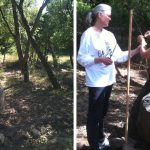
 Our Faculty Voices series invites Pacifica faculty and alumni into engaged conversation, a community call-and-response to which all are invited.
Our Faculty Voices series invites Pacifica faculty and alumni into engaged conversation, a community call-and-response to which all are invited.
Alternatives to Violence: first facilitator training successful
Mary Watkins | Co-Chair, Depth Psychology Program
Community Psychology, Liberation Psychology, Ecopsychology Specialization

| originally posted on 25 Feb 2013
•|•|•|•
In the last six months, Pacifica’s Alumni Association has partnered with the institute’s Community Psychology, Liberation Psychology, and Ecopsychology specialization of the M.A./Ph.D. Depth Psychology Program and Alternatives to Violence, California to conduct three Alternatives to Violence workshops: Basic, Advanced, and Training for Facilitators. Twenty alumni, students, faculty, staff, and community members are now trained to begin co-facilitating Alternatives to Violence programs in prisons, the youth authority, and in various community groups. A local Santa Barbara group has formed to help facilitate the growth of these workshops in community settings throughout Santa Barbara County. Several students are involved in community-based research on the efficacy of AVP, with more likely to soon join in.
Prison workshops cannot be held without community facilitators. Adding twenty new facilitators into such workshops will help make the life transformative space that AVP provides available for hundreds more inmates. We wish to thank Pacifica’s Director of Alumni Affairs Dianne Travis-Teague; Pacifica’s Public Program Director Toni D’Anca; Alumni Association Executive Committee Member Lupe Zuniga; and the Alumni Association’s webmaster Eugene Ahn for their help in making these workshops happen. Many thanks to workshop facilitators Pat Hardy (Coordinator for AVP California), Ann Leonard (alumna), Walter Hammond, Willie Bermudez, Sam Lewis, and Mary Watkins.
AVP workshops empower people to lead nonviolent lives through learning conflict resolution skills, affirmation, respect for all, community building, cooperation, and trust. They help participants manage strong feelings such as anger and fear, deal more effectively with risk and danger, build good relationships with other people, communicate well in difficult situations, help people recognize the skills they already have and learn new ones, be true to themselves while respecting other people, and understand why conflict happens and how it can be transformed.
The Alternatives to Violence Program is active in many states and countries. Your education at Pacifica has contributed to your being wonderful candidates to facilitate this work. Please join an AVP workshop near your community if you are called to this work.




